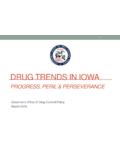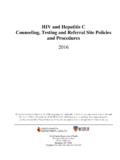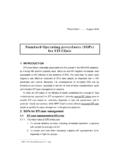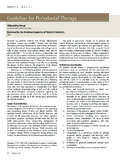Transcription of A GUIDE TO - Iowa
1 Updated 7-2-12 A GUIDE TO WORKPLACE DRUG testing IN iowa Prepared by the Governor s Office of Drug Control Policy Wallace State Office Building 502 E. 9th Street, First Floor Des Moines, iowa 50319 Phone 515-725-0300 Fax 515-725-0304 Note: This information is for general informational purposes only, and does not constitute legal advice. You are encouraged to seek legal counsel before implementing a drug-free workplace policy. 2 To Test or Not To Test? The purpose of the State of iowa s private sector drug testing law iowa Code Section (& iowa Administrative Code Section 641) is to enhance worker safety by creating workplaces that are free of drugs and substance abuse or misuse. One tool available to private sector employers is drug testing (inclusive of alcohol testing ), that often is coupled with educational efforts as part of a comprehensive drug-free workplace program.
2 Each employer must first decide if drug and/or alcohol testing is appropriate for them. Under iowa law, workplace drug or alcohol testing is optional for private sector employers. Federal laws or regulations governing drug or alcohol testing supersede state law in iowa . Before making a decision on drug or alcohol testing under iowa law, several factors should be considered, including, but not limited to, the following: A. Types of private sector workplace drug testing permitted in iowa : 1. Unannounced testing of workers randomly selected from pools of employees, consisting of (a) the entire employee population at a particular work site, (b) the entire full-time active employee population at a particular work site, or (c) all employees at a particular work site who are in a pool of employees in a safety-sensitive position; 2. testing of employees during, and after completion of drug or alcohol rehabilitation; 3.
3 testing of employees for reasonable suspicion, which may include (a) direct observation of substance abuse or related impairment while at work, (b) abnormal conduct or significant deterioration in performance while at work, (c) a credible report of alcohol or drug use, (d) evidence of tampering with a drug test, (e) evidence that an employee has caused an accident while at work causing sufficient injury or damage to require a report to OSHA, or (f) evidence that an employee has made, sold, possessed or used drugs while at work; 4. testing of prospective employees; 5. testing of employees, as required by federal law or regulation or by law enforcement; and 6. testing of employees in the investigation of workplace accidents that cause sufficient injury or damage to require a report under iowa Code chapter 88, or that result in damage to property in an amount reasonably estimated at the time of the accident to exceed $1,000.
4 B. Employer responsibilities when drug testing in iowa include: 1. Prior to testing , the employer must establish a detailed written drug testing policy that is provided to every person subject to testing and made available for review by employees and prospective employees. Special provisions apply to dealing with minors. 3 2. Prior to testing , the employer must establish an employee awareness program to include an Employee Assistance Program or a resource file where workers can access help for substance abuse problems. 3. The employer must provide supervisors with a minimum of two (2) hours of training initially, and one (1) hour of training each year subsequently. The initial two hour training must include, but is not limited to, (1) information concerning the recognition of evidence of alcohol and other drug abuse, (2) the documentation and corroboration of employee alcohol and other drug abuse, and (3) the referral of employees who abuse alcohol or other drugs to the employer assistance program or the resources file.
5 4. In the event of a positive alcohol test in which the alcohol concentration exceeds the level established by the employer and under certain other conditions the employer may be required to pay up to $2,000 in rehabilitation costs for the employee in question, depending on employee benefit plan coverage. This requirement applies only to employers with at least 50 employees and only if the employer has employed the employee for at least 12 of the preceding 18 months; the employee is a first-time violator of the employer s substance abuse policy; and the employee agrees to receive rehabilitation, if required by the employer s policy. 5. A laboratory doing business for an employer that conducts drug or alcohol tests must file an annual report with the iowa Department of Public Health by March 1 of each year concerning the number of positive drug and alcohol test results during the previous calendar year.
6 Put It in Writing Private sector drug or alcohol testing is optional in iowa . However, employers who choose to test can do so only after developing and disseminating a written policy. Here are some things to keep in mind when developing a written policy. 1. Drug or alcohol testing must be conducted within the terms of a written policy. 2. The written policy must be provided to every employee subject to testing , and be available for review by employees and prospective employees. Typically, employees and prospective employees are asked to sign a certification that they have read and understand the policy as a condition of their employment. Many times, the employer s Drug-Free Workplace Policy will be included in an employee manual. Additionally, some employers may choose to post the policy in common areas. 3. In the case of a minor, the employer must provide a copy of the written policy to a parent of the employee or prospective employee and receive acknowledgement from the parent that a copy of the policy has been received ( , certified mail, return receipt requested).
7 4. The employer s written policy must provide uniform requirements for disciplinary or rehabilitative actions that will be taken against an employee who tests positive for alcohol or drugs, or who refuses to provide a testing sample. An employer 4 may not take any action against an employee that is not stated in the written policy. 5. If the written policy provides for alcohol testing , the employer must establish a standard for alcohol concentration that will constitute a violation of the policy. The standard for alcohol concentration shall not be less than .04, expressed in terms of grams of alcohol per 210 liters of breath, or its equivalent. An employee or prospective employee who tests positive for drugs or alcohol, or who refuses to provide a testing sample in violation of the employer s written policy may be subject to disciplinary and/or rehabilitative actions, including, but not limited to: 1.
8 Employer-provided or approved rehabilitation, treatment or counseling (*see conditional requirement in the case of certain positive alcohol tests); 2. Suspension of an employee, with or without pay, for a designated period of time; 3. Termination of employment; 4. An employer s refusal to hire a prospective employee; or 5. Other adverse employment action, in conformance with the employer s written policy, including relevant collective bargaining agreement provisions. Remember, these actions individually or in combination are options available to private sector employers, and can only be executed if they are so stated in the employer s written policy. Supervisor Training In order to conduct private sector drug or alcohol testing in iowa , an employer must require supervisors involved with testing to attend a minimum of two (2) hours of initial training and a minimum of one (1) hour of training every year thereafter.
9 This training must include, but is not limited to: 1. Information concerning the recognition of evidence of employee alcohol and other drug abuse; 2. Documentation and corroboration of employee alcohol and other drug abuse; and 3. Referral of employees who abuse alcohol or other drugs to the employer s Employee Assistance Program or to a resource file maintained by the employer. Though no entity is charged with providing this training, many of the state-licensed substance abuse provider agencies may offer workplace training for a fee, negotiated on an agency-by-agency basis. Occupational health agencies and other providers may offer similar services. Additional organizations listed online and in telephone directories may also offer these services. An employer may opt for in-house training, particularly on those matters that relate directly to actionable elements of the employer s policy.
10 5 Employee Education and Resources Employers must establish an awareness program, to inform employees about the dangers of drug and alcohol use in the workplace, and comply with the following requirements. 1. If an employer has an Employee Assistance Program, employees must be informed of the benefits and services offered by the program. An employer must post notice of the program in conspicuous places and explore alternative means of publicizing the services. Additionally, the employer must inform employees how they can access and utilize the program; or 2. If an employer does not have an Employee Assistance Program, the employer must maintain a resource file of certified substance abuse programs available to assist employees with personal or behavioral problems. The employer must notify employees of the existence of the resource file, and provide information on how to access services listed in the file.








